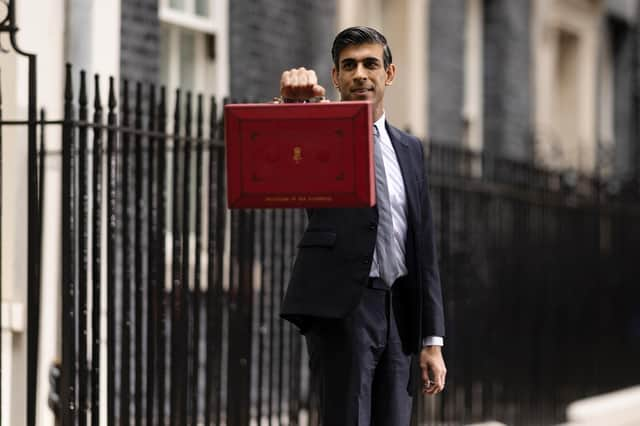Politically Speaking by Jon Trickett: What we need to see is a real increase in people’s incomes


If you regularly take flights from one part of the UK to another, or if a bottle of champagne is your Friday night drink, then chancellor Rishi Sunak was handing you money last week.
For banks, there was a big cut to taxes on their profits. That’s the same tax they were made to pay because ordinary taxpayers bailed them out in 2008.
Advertisement
Hide AdAdvertisement
Hide AdBut if you’re struggling with energy bills, or the weekly supermarket shop is mounting up, and perhaps because you work hard but need universal credit payments to get by, or you’re a pensioner, then life looks set to get more challenging in the next few months because the Chancellor left you out of his plans.
In the budget, the Chancellor took no action to address the cost-of-living crisis. Real wages are set to fall again next year, national insurance payments are rising, universal credit has been cut, the pensions triple lock has been dropped.
Fourteen million are now living in poverty - most of whom are actually in work - and there has been a big increase in the use of food banks in the last 12 months. During that time, the richest 250 people have seen an increase of £106 billion in their wealth. These numbers are so eye-watering they are difficult to comprehend.
It’s been the same for the past decade. Real earnings are only just catching up with what they were in 2009 — that’s basically a 12-year gap with no real increase in pay for much of the country. At the same time, the richest people have seen their wealth increase by £538 billion.
Advertisement
Hide AdAdvertisement
Hide AdTo mask this chasm the treasury has been forced to generate positive headlines about a future ‘high wage economy’, from increasing the national minimum wage, to ending the public sector pay freeze, and amending the universal credit taper rate.
But taking into account the impact of inflation on bills, income tax, higher national insurance payments, much of this increase won’t ever get taken home.
In my constituency, people still earn on average less than the median across the country. People here are on about £474 a week before tax, whilst people in the Prime Minister’s patch get on average nearly £300 per week more.
And locally too, there were 26,537 households on universal credit earlier this year. Most of these families have people in-work. They have now all had £20 a week cut from their payments.
Advertisement
Hide AdAdvertisement
Hide AdThis has also seen an increase in food bank reliance. We’ve had more people need a food bank parcel in the past year than the one before, up from 5,000 to over 6,000 distributed in Wakefield by Trussell Trust.
The reality is the government is delivering for the super-rich, who are getting wealthier, while low and middle incomes are stretched further and further. And the real impact of the budget was to reinforce that.
In recent weeks I’ve argued for a radical overhaul of our tax system. As much as we can make our income tax system more progressive and target those at the top, we also need to start to tackle wealth itself.
I’ve identified various options for a wealth tax, each of which could generate billions more in revenue for the government and for our public services. Wealth is taxed at a much lower rate than income so it is only right that we level up tax on wealth. It is important to point out that a wealth tax would be for the richest, and would not include main homes.
Advertisement
Hide AdAdvertisement
Hide AdIf implemented, these measures would transform our public finances making money available for our underpaid key workers, those struggling with the universal credit cut, and neglected public services, and engineer a transformative investment-led drive to rebuild a dynamic green economy capable of competing with the best in the world.
What we need to see is a real increase in people’s incomes, an end to rip-off bills, and those who are most able to pay their fair share to make our economy work for everyone.